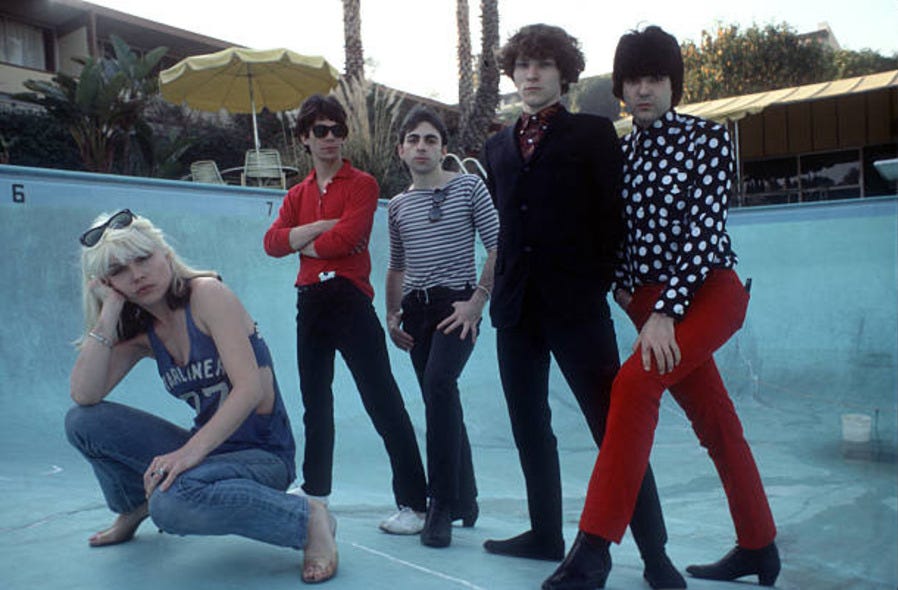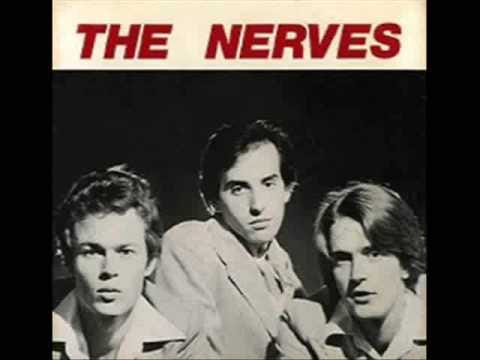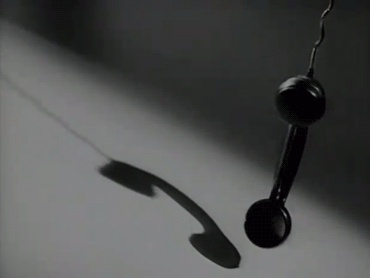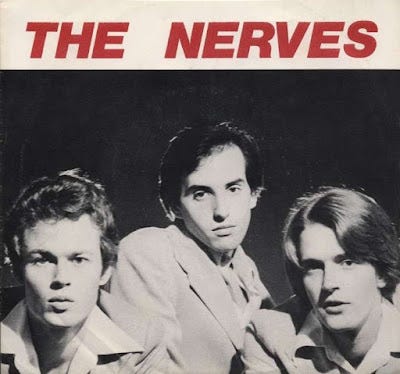Inside Tracks #8: Jack Lee "Hanging On the Telephone" with Covers by The Nerves, Blondie, Def Leppard, Jimmy Somerville
All over the arrangement map: Trendsetting power poppers to chart-topping new wavers to unexpected hard rockers who dropped a "g", to an out'n'proud Scot going acoustic and falsetto.
The Nerves 4-song EP, 1976, Self-Pressed

The Nerves were an unlikely aggregate of three songwriters, a fact which probably helped seal their fate as a band whose lifespan can more easily be measured in months than in years. They met and formed in San Francisco, having all moved there from widely disparate places.
After 1978, when they split, each went on to a measurable, and even influential career with other bands (Case with The Plimsouls, and Collins with Paul Collins’ Beat)…except for the songwriter responsible for “Hanging on the Telephone,” Jack Lee. One album in 1981, optimistically-titled, Jack Lee’s Greatest Hits, Vol. 1, is the extent of his recorded canon.
Jack Lee (above) was born in Alaska on March 25, 1952, and died of colon cancer in Santa Monica on May 26, 2023, at age 71. In the early ‘70s, Lee left home and traveled to San Francisco, hoping to make a career out of music, according to AllMusic.com.
Initially having trouble getting gigs, he busked for change along Fisherman’s Wharf, where he met fellow street musician Peter Case, an aspiring singer/songwriter who had just moved from Buffalo. Lee and Case liked each other's songs, and they eventually teamed up with transplanted New Jersey-ite Paul Collins.
In 1974, they started playing gigs as The Nerves, with Lee on guitar, Case on bass, and Collins on drums. The original “Hanging on the Telephone” was written by Lee in 1973, while he was living in San Francisco, and references the contentious relationship with the mother of the woman with whom he was living at the time, according to Alchetron.com.
It may also refer to his prior relationships with the mothers of his first two children. The song was originally demoed with local musicians in 1975 at the Different Fur studio in San Francisco’s Mission District.
In 1976, the Nerves relocated to Los Angeles, and self-released their four-song EP that featured “Hanging on the Telephone” (via YouTube; song is no longer available on Spotify):
The group set out on a nationwide tour they booked themselves, as they opened for major label kingpins Elvis Costello (Columbia) and Mink DeVille (Capitol). They covered nearly 25,000 miles in a single 1969 Ford LTD Wagon….
….and when they came home to L.A., they started booking independent shows for themselves and other L.A. bands.
The Nerves’ sound was “lean, but hooky pop with a British Invasion influence,” but they also admired the spunk and DIY ethos of the still-growing punk scene in L.A. Calling their Hollywood practice space “the Hollywood Punk Palace,” they began hosting shows with bands such as the Weirdos, the Screamers, the Zeros, and the Dils.
Just as The Nerves were building a bit of momentum, they came to a sudden stop in 1977 when Lee quit the band; Collins and Case (l-r, pictured below) briefly continued as the Breakaways, but by year’s end that band had also broken up.
2. Blondie, 1978, Chrysalis Records
Initially, Lee laid low and was barely visible on the music scene, but in 1978, just as his phone and electricity were about to be shut off for nonpayment, he was contacted (appropriately enough, by telephone) by Blondie’s Debbie Harry, asking him if her band could record a cover of “Hanging on the Telephone” for their third album, Parallel Lines.
According to Helen Donlon in Fire of Love: A Jeffrey Lee Pierce Retrospective in The Quietus (2019), the band discovered the song after Jeffrey Lee Pierce of The Gun Club (1979-1996 L.A.-based “punk blues” band) sent the band a cassette of the track. Debbie explained:
“We were playing it in the back of a taxicab in Tokyo, and the taxicab driver started tapping his hand on the steering wheel. When we came back to the US, we found that the Nerves weren't together anymore and we said, ‘Gee, we should record this.’”

Predictably, Lee gave them his blessing (with Debbie fronting Jack the utilities dough), and Blondie’s cover of the song (produced by Mike Chapman, who produced the landmark debut album by The Knack the following year) rose to #5 on the UK singles charts, and hit the Top 20 in Ireland, Belgium, and the Netherlands.
The song was indeed included on Blondie’s Parallel Lines in 1978 (in fact, it was the lead track), and went on to sell over a million copies in the US alone, peaking at #6 on Billboard’s album chart.
Blondie’s cover begins with a sound effect of a telephone ringing: The idea was proposed by producer Chapman, according to Kembrew McLeod in his 2016 publication, Blondie’s Parallel Lines (33 and 1/3): “The Blondies all thought that was stupid and too gimmicky, but I said, ‘C’mon, guys, gimmicky? This is Blondie. Let’s give it a try!’”
Blondie employs “a double backbeat rhythm in its drumming pattern, meaning the ‘off’ beats alternate between a quarter note and two eighth-notes,” according to Theo Cateforis from Are We Not New Wave?.
This percussion style also appeared on other power pop singles from the period, like the Romantics’ 1978 release that just preceded “What I Like About You,” “Tell It to Carrie.”
Def Leppard, 2006, Island Records
“In 2006, Def Leppard released an album of covers, called Yeah!. What stood out about their version of ‘Hanging on the Telephone’ was how not like Def Leppard it sounded,” per Patrick Garvin of PopCultureExperiment.com in 2016.
“I wasn’t necessarily expecting the loud drums or guitars of ‘Armageddon It’ or ‘Photograph’ or ‘Pour Some Sugar On Me,’ but I was at least expecting something familiar in the band’s sound,” Garvin continues.
“Even [lead singer and resident musicologist] Joe Elliott didn’t sound like himself. As far as versions of the song go, it was a fine, faithful cover, but the fact that I had to check multiple times to make sure I was really listening to Def Leppard, and not some generic band, spoke volumes”:
Jimmy Somerville, 2009, Jess-E Musique, Ltd.
Jimmy Somerville, formerly of Bronski Beat and The Communards in the 1980s, also whelped a covers album just three years after Leppard’s. His Suddenly Last Summer 2009 effort “showcased his falsetto voice over bare, acoustic instrumentations,” Patrick Garvin opined.
“The stripped-down nature of [this] performance allowed listeners to pay more attention to the lyrics. The previous versions — with their loud guitars and banging drums — highlighted the anger and frustration of the song.
“By stripping all that away, Somerville drew out a vulnerability that demonstrated the sadness of the song in a new way,” [while also staying true to being out’n’proud, an element never once visited in the many previous covers.]
















Like Steve, I didn't know Blondie's wasn't the original until several years ago. This original version has grown to become my favorite, though Blondie's is a close second. L7 also covered it, and there's isn't terrible.
Plimsouls might be worth an "autopsy" all their own!
Excellent choice of song to give the Inside Tracks treatment. I will admit to thinking Blondie wrote the original until about 8 or 9 years ago when I started listened to the radio show turned podcast “Sound Opinions” with Jim Derogatis and Greg Kot. At the end of each episode they would play listeners voice messages commenting on previous episodes. The musical cue leading into the segment was one of 4 or 5 songs about the “telephone” and The Nerves version was used quite often.
I knew the Def Leppard version -- I own that covers album -- but had no idea Jimmy Somerville did one too! I like all 4 versions but like Sade (and many others) once said: “It’s never as good as the first time.” So my soft spot will always be Blondie.